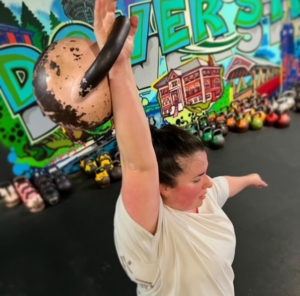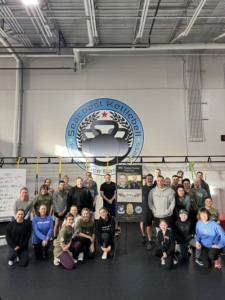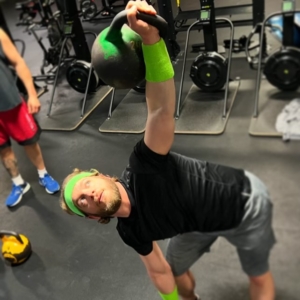April 20th & 21st, 2024

HIIT
Round 1
1 Arm Swings
Fun Run
Round 2
Push Press
Fun Run
Round 3
Goblet Split Squats
Fun Run
Round 4
1 Arm Rows
Fun Run
Round 5
Snatches
Fun Run

Round 1
1 Arm Swings
Fun Run
Round 2
Push Press
Fun Run
Round 3
Goblet Split Squats
Fun Run
Round 4
1 Arm Rows
Fun Run
Round 5
Snatches
Fun Run
Sam had tried other gyms in the past and barre, but didn’t get the results she was looking for. Since joining Seacoast Kettlebell, she has gained muscle, strength and feels confident! Check out her story!

Round 1
Rowing Sprints
Round 2
PB Double Hop Burpees
KB Pullover Sit Up
PB Z-Hops
KB Traveling Push Ups
PB Rotational Squats
KB H2H Swings
PB In & Out Abs
April 27th, 2024! Dover & Portsmouth 730 & 845

Round 1
Pull ups
Round 2
Suitcase Reverse Lunges
Round 3
Kettlebell Diablo
DB Dead Stop Rows
DB Long Cycle Cleans
DB Thrusters
Push Ups

Top of The Minute Torture
Air Assault Bike Sprints
TRX Split Jump
DB KB LC Cleans
Ab Mat or Shin Grab
Sit Up
Burpees
The kettlebell snatch is an awesome, full body exercise that offers benefits to strength, power and conditioning. Some kettlebell experts believe the snatch is the king of kettlebell exercises and unlike the barbell Olympic squat style snatch you are far less likely to injury yourself. Read on to explore the advantages of the kettlebell snatch, the muscle groups involved, how to perform the exercise correctly, and a sample workout to incorporate it into your fitness routine.
The kettlebell snatch engages multiple muscle groups simultaneously, making it an excellent exercise for athleticism, overall strength and conditioning. It targets the shoulders, back, hips, glutes, hamstrings, and core, providing a comprehensive full-body workout.
The explosive nature of the kettlebell snatch helps improve power and explosiveness. As you generate force from the hips and transfer it through your body to propel the kettlebell overhead, you develop strength and speed, which can be beneficial in various sports and activities.
Performing the kettlebell snatch at a high intensity can elevate your heart rate and challenge your cardiovascular system. This exercise can be a time-efficient way to improve cardiovascular fitness while also building strength and endurance.
The kettlebell snatch requires a strong grip to control and stabilize the kettlebell throughout the movement. Regular practice of this exercise can help develop grip strength, which is essential for many daily activities and sports.
The kettlebell snatch primarily targets the following muscle groups:
1. Shoulders: The deltoids and rotator cuff muscles are heavily engaged during the upward phase of the snatch when you raise the kettlebell overhead.
2. Back: The snatch recruits the muscles of the upper and lower back, including the latissimus dorsi, rhomboids, and erector spinae, to maintain a stable and upright posture throughout the movement.
3. Hips and Glutes: The hip extension is a key component of the kettlebell snatch. The gluteus maximus and hamstrings are responsible for generating power and driving the kettlebell upward.
4. Core: To perform the snatch efficiently, you need to engage your core muscles, including the rectus abdominis, obliques, and transverse abdominis, to maintain stability and prevent excessive movement of the spine.
1. Start with the kettlebell approximately 12 inches in front of you with your feet in a hip-width stance.
2. Hinge at the hips and grab the kettlebell handle with one hand, keeping your back flat and core engaged.
3. Hike the kettlebell back between your legs like a football.
4. Drive through your heels and extend your hips explosively, swinging the kettlebell upward. Guide the kettlebell up close to your body.
4. As the kettlebell reaches shoulder level, retract your arm slightly, pulling your elbow back and then punch your hand through the handle.
5. Lock out your arm and stabilize the kettlebell overhead.
6. We recommend beginners lower the kettlebell to their shoulder and then and then guiding it down and back towards their hips into a powerful back swing.
7. Repeat for the desired number of reps!
Here is a sample workout involving the kettlebell snatch:
1. Warm-up: Perform some dynamic stretches and mobility exercises for the shoulders, hips, and core.
2. Circuit: Perform 3-4 rounds of the following exercises with minimal rest between each exercise and a short rest between rounds:
– Kettlebell Snatch: 10-12 reps per arm
– Goblet Squat: 10-12 reps
– Push Up: 10-12 reps
3. Finisher: Complete a Tabata-style finisher by performing kettlebell snatches for 20 seconds, followed by 10 seconds of rest, repeated for a total of 4 minutes.
Remember to start with a weight that allows you to perform the exercise with proper form and gradually increase the intensity as you become more proficient. It is also crucial to consult with a qualified fitness professional before starting any new exercise program, especially if you have any underlying health concerns or injuries.

Round 1
Barbell Bench Press
Round 2
Dumbbell RFE Split Squat
Round 3
DB KB Kickstand Deadlifts
Round 4
EX Bar Curl 21’s
Round 5
Sled Push- Dover
Tailpipe Row + Rack Hold – Portsmouth
April 15th, 2024

Plank Sandwich
Plank
Frog Sit Ups
Flutter Kicks
Shin Grabs
Plank
Round 2
Pull Ups
Push Ups
Swings
Squats
400m run

DB KB Dead Cleans
DB KB Push Press
DB KB Deadstop Rows
KB Goblet Squats
KB Rainbows
BW Rev Lunges or Split Jumps
Dead Animal Crunches
Run 200m

Round 1
Squat Thrust
Push Ups
Air Squats
Rows
Round 2
Goblet Squats
Push Ups
RS Swings
Ski Ergs
Round 3
MB Squat to Throw
MB Slams
MB RS Twist
Bikes
